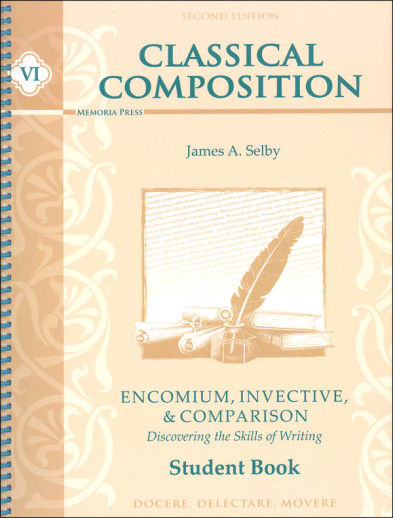We use cookies to make your experience better. To comply with the new e-Privacy directive, we need to ask for your consent to set the cookies. Learn more.
Classical Composition VI: Encomium, Invective, and Comparison Stage Student Book Second Edition
The Student Book provides space to complete most assignments (although some final drafts are to be completed on separate paper). Starting with Book IV (also true of the Combo Books), some brief teaching guidelines are included with the Student Book. Includes 18 lessons that persuade as to what is or is not. Lessons include Aphthonius' Encomium on Thucydides plus Encomiums on Individuals (Chaucer and Dante), Encomium on a virtue (God's Love, Wisdom), Encomium on Nature (tiger), Invectives on an individual (Philip, Judas Iscariot, and Saddam Hussein), Invectives on a vice (lying, abortion), Invective on Nature (grasshopper), Comparison of individuals (Achilles/Hector, Paul/Peter, Jesus/John the Baptist, Adolf Hitler/Saddam Hussein), Comparison of Vice and Virtue (Humility/Pride), and Comparison in Nature (winter/spring).
These materials offer complete coverage of both writing and grammar.
We might have predicted two things: 1) Memoria Press would add a series on composition to their curriculum offerings; 2) Memoria's composition program would follow the progymnasmata (series of fourteen skill steps in classical composition established by the long ago Greeks). In the typical user-friendly manner that is Memoria's trademark, that's what they've done and the first courses in the series are impressive.
A successful composition program should reflect and accomplish three goals: 1) demonstrate a basic knowledge of grammar rules; 2) hone the ability to think through a problem in such a way as to bring us to truth; and 3) communicate with an elegance of style that will persuade others that we have something important to say. Modern composition theory based on four types of writing - descriptive, narrative, argumentative and expository - has devolved from the progymnasmata but is not producing good writers. Returning to the classical progymnasmata model (Memoria uses exercises developed by Aphthonius in the late fourth or early fifth century A.D.) produces writers well-prepared for classical rhetoric.
To give you an idea of how user-friendly these courses are: Each lesson in the Fable Stage starts with reading the fable, determining the three plot components, and discovering synonyms for selected words leading to writing sentences in a varied way. The fable is then outlined and two paraphrases are written incorporating specific suggestions. Instructions for each step are provided.
What about when the instruction becomes more involved? In the Refutation/Confirmation Book, the student is led step-by-step (credit or discredit, clarity, plausibility, possibility/impossibility, consistency, propriety, expediency, and epilogue) through the process of either refuting or confirming a published position. If those steps sound scary to you, keep in mind that the student has been incrementally trained to be ready for them in the three proceeding courses. Likewise, the student is led through each of these steps with questions, written answers, and dilemmas (discussions), culminating in a rough draft directly applicable to that particular step.
The Teacher Guide for each book includes an introduction to the material to be covered, guidelines for instruction, definition of terms (important because many of the terms are unfamiliar), and lightly scripted lesson plans in a wraparound format (reduced copies of the student pages w/ answers). Appendices in some provide additional definitional and illustrative information pertinent to the course. For instance, the appendices in the Chreia/Maxim Stage Teacher's Guide provide an advanced rubric and figures of description with examples.
The Student Books provide space to complete most assignments (although some final drafts are to be completed on separate paper). Starting with Book IV (also true of the Combo Books), some brief teaching guidelines are included with the Student Book.
DVD sets (where available) feature an instructor who teaches each lesson thoroughly. Some courses may have streaming videos as an option.
Lesson Plans (where available) provide a week-by-week daily checklist for the course lesson assignments.
Each course is both this year's work and planned review for future years. About ¾ of each course's lessons are to be completed in that year and the remainder saved to be used for review. The scope and sequence for this program:
- Grades 4-6 - Fables, Narratives, Chreia/Maxim
- Grades 6-8 - Chreia/Maxim, Refutation/Confirmation, Common Topic
- Grades 9-12 - Encomium/Invective/Comparison, Characterization, Description, and Thesis/Law
For students beginning the program later than 4th grade, see Memoria Press' site for a full scope and sequence. Regardless of grade level, all students entering the program will start at the Fable stage, but students older than 8th grade will do each course in a semester, not a year.
Compared to other classical writing programs we carry, this one seems more do-able. Lessons are straightforward with good explanation and illustration. ~ Janice
18 lessons that persuade as to what is or is not. Lessons include Aphthonius' Encomium on Thucydides plus Encomiums on Individuals (Chaucer and Dante), Encomium on a virtue (God's Love, Wisdom), Encomium on Nature (tiger), Invectives on an individual (Philip, Judas Iscariot, and Saddam Hussein), Invectives on a vice (lying, abortion), Invective on Nature (grasshopper), Comparison of individuals (Achilles/Hector, Paul/Peter, Jesus/John the Baptist, Adolf Hitler/Saddam Hussein), Comparison of Vice and Virtue (Humility/Pride), and Comparison in Nature (winter/spring). ~ Janice
| Product Format: | Paperback |
|---|---|
| Brand: | Memoria Press |
| Grades: | 9-11 |
| ISBN: | 9781615388547 |
| Length in Inches: | 11 |
| Width in Inches: | 8.5 |
| Height in Inches: | 0.375 |
| Weight in Pounds: | 1.1 |

